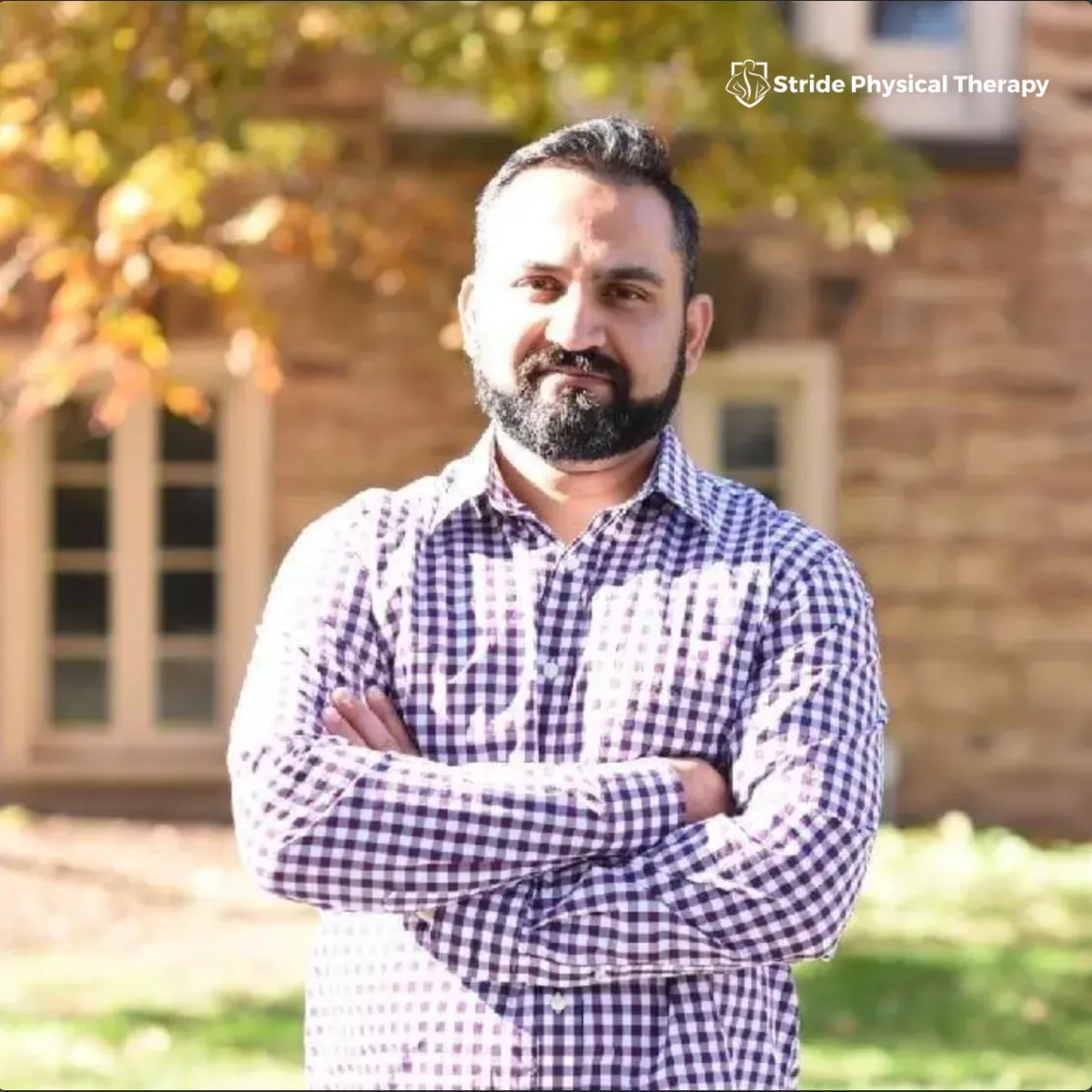Your jaw is connected to your skull by the temporomandibular joint. When this joint is harmed or injured, it can lead to TMJ dysfunction. This issue can cause your jaw and the muscles around it to become painful and stiff. Since the joint involves bones, tendons, and muscles, you might experience pain on one or both sides of your jaw, making activities like opening your mouth, speaking, yawning, and chewing quite challenging.
Struggling to chew, yawn, or hearing a click in your jaw? These could be signs of TMJ issues. Book a visit with Stride Physical Therapy for effective treatments to ease your jaw discomfort.
How can I tell if I have TMJ Dysfunction?
Diagnosing TMJ dysfunction doesn't have a one-size-fits-all solution. If you suspect you have TMJ issues, your doctor will look over your medical history and examine you. They might also refer you to a specialist like an ENT (ear, nose, and throat doctor) or a dentist who focuses on jaw problems.
Before diagnosing TMJ dysfunction, it's important to exclude conditions with similar symptoms, such as trigeminal neuralgia, salivary gland problems, or swollen lymph nodes. After confirming your diagnosis, your treatment will be tailored to your specific symptoms.

Quick Links
FAQs
If you have TMJ dysfunction, you might experience jaw pain, a popping sensation when you move your jaw, headaches, tender jaw muscles, your jaw getting stuck, temple pain, and ear pain. Common causes are teeth misalignment, constant chewing gum, arthritis, grinding teeth, or a jaw injury.
How will physical therapy help with my TMJ Dysfunction?
Home treatments like painkillers (Ibuprofen, Aspirin) and ice packs might ease TMJ pain. Sedative oils like clary sage or lavender could offer short-term comfort. If these don't help long-term, stronger options like muscle relaxers, anti-inflammatories, dental splints to stop grinding, acupuncture or even surgery may be needed.
For a natural method to treat TMJ dysfunction, consider physical therapy as a highly effective option. When you visit Stride Physical Therapy, we'll thoroughly examine your neck, shoulders, and upper back to see if they're linked to your discomfort. Our experienced Freehold, NJ physical therapists will then tailor a treatment plan to address your unique symptoms and requirements.
Our physical therapist will assess your jaw movement and ease tension in your neck and head muscles. Physical therapy aims to improve jaw function and muscle-joint coordination. Your personalized treatment may include jaw exercises, massage, joint movement techniques, myofascial release, electric therapy, or ultrasound.
Contact Stride Physical Therapy for relief:
Our caring physical therapists focus on you and your wellness, striving to alleviate your symptoms. If you're in Freehold, NJ and struggling with TMJ dysfunction, book an appointment at Stride Physical Therapy Freehold, NJ. Say goodbye to jaw pain and stiffness.
MEET YOUR RECOVERY TEAM

Kanwal Bhardwaj
PT, M.Sc.PT, CIMT, CMNT
Meet Kanwal Bhardwaj, PT, M.Sc.PT, CIMT, CMNT, the driving force behind Stride Physical Therapy in Freehold, NJ. With over 20 years of dedicated experience in the field, Kanwal brings a wealth of expertise and a passion for holistic healing to his practice. Kanwal's journey began with a Master of Science in Orthopedic Physical Therapy from Quinnipiac University in 2004. Over the years, he honed his skills and gained invaluable insights during 18 years of service in outpatient physical therapy offices. In 2014, fueled by a desire to deepen his understanding of patient care, he pursued a manual therapy certification (CIMT). This transformative experience allowed him to adopt a whole-body perspective, focusing on treating the root cause rather than just the symptoms...
At Stride Physical Therapy, we're dedicated to transforming lives. With a focus on the root cause of your condition, we're here to help you regain mobility and embrace an active lifestyle. What sets us apart? Our genuine passion for what we do. Let's stride towards a brighter tomorrow together.
Elevate Your Health with Our All-Inclusive Wellness Services!
Take one step closer to a pain-free life with Stride Physical Therapy! Discover medication and surgery-free solutions with our sessions.
Health Blog

A Physical Therapist’s Perspective on Chronic Back Pain
At Stride Physical Therapy, we see a lot of chronic low back pain and it’s something we know how to handle. Understanding what causes this pain and how you can prevent it is important to us, so we always make sure our patients and their families are well-informed. Remember, having chronic back pain doesn’t mean you have to accept it as a normal part of getting older. You can still experience less pain and enjoy improved mobility, regardless of how long your back has been bothering you. Book an appointment with Stride Physical Therapy to get a personalized consultation. Keep reading to uncover five key insights our physical therapy team has learned about chronic back pain.
1. Most People Will Experience Back Pain at Least Once
Research shows that the majority of people (up to 80%) will have at least one episode of back pain in their lifetime. While not everyone will suffer from long-lasting pain, many cases resolve within a few weeks without special medical care. However, underlying issues like inflexibility or poor body mechanics can persist, increasing the likelihood of recurring pain and injury. Consulting with a physical therapist early can help uncover and address these hidden factors, reducing the risk of conditions like muscle strains, joint misalignments, degenerative disc disease, disc herniation, and nerve impingement.
2. Most Risk Factors for Chronic Back Pain Are Preventable
Many back pain risk factors are preventable. This means reducing your risk of chronic pain and alleviating symptoms is largely within your control. Common preventable risk factors include:
Sedentary lifestyle
Excessive weight
Smoking
Poor posture
Physically demanding jobs that require frequent sitting, bending, twisting, heavy lifting, or exposure to vibration
Stress, anxiety, and depression
At Stride Physical Therapy, we take a holistic approach to treatment, addressing both physical and psychological factors to help you achieve long-term relief.
3. Exercise Often Improves Chronic Back Pain
Moving around with chronic back pain can be challenging, but participating in daily movement is crucial for pain management. Exercise keeps muscles and tissues strong, boosts circulation, reduces chronic inflammation, enhances mood, relieves stress, and helps maintain a healthy body weight. Activities like walking, cycling, and specific exercises to improve tissue healing, strength, flexibility, and endurance are proven effective. A physical therapist can help you develop a safe, effective, and enjoyable exercise program tailored to your needs and goals.
4. Surgery and Long-Term Medications Aren’t Always Necessary
Contrary to popular belief, conditions like herniated discs don’t always require surgery. Invasive procedures like spinal fusions are usually not the first option for chronic back pain. Research indicates that only about half of first-time back surgeries alleviate symptoms, and repeat surgeries have even lower success rates. Surgery also carries risks such as prolonged recovery time and post-operative complications.
Physical therapy is recognized as a first-line treatment for chronic back pain, often reducing the dependency on opioid medications. This makes physical therapy a safer, more cost-effective option.
5. Chronic Back Pain Can Improve Even Without Knowing the Exact Cause
Many cases of back pain are "idiopathic," meaning the exact cause is unknown. Imaging studies like MRIs often don’t correlate with a person’s symptoms. A physical therapist is trained to evaluate, diagnose, and treat spinal conditions. Even if the exact cause is unclear, physical therapy can still provide relief by addressing symptoms and contributing factors like poor posture, decreased hip and shoulder range of motion, and weak core muscles.
Ready to Make Chronic Back Pain a Thing of the Past?
If you're ready to reclaim your active life and start living with less pain, contact Stride Physical Therapy today. Our team is dedicated to helping you achieve long-term relief and improved function.


